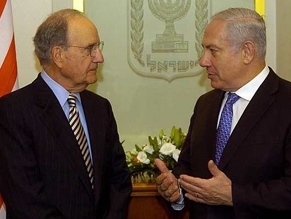|
World Jewish News

U.S. envoy George Mitchell and Prime Minister Benjamin Netanyahu Photo by: Moshe Milner / GPO
|
Visiting U.S. envoy Mitchell to push Israel for stance on core Mideast issues
13.12.2010, Israel and the World U.S. special envoy George Mitchell will meet with Prime Minister Benjamin Netanyahu in Jerusalem on Monday evening to put forth U.S. ideas for moving the peace process forward.
Mitchell is expected to make clear to Netanyahu that the Obama administration wants him to take a position in the coming weeks on the core issues, with an emphasis on borders.
Mitchell is also scheduled to hold talks with Palestinian President Mahmoud Abbas in Ramallah. But the brunt of the work will be in Israel because the Palestinians have already submitted their opening positions on all the core issues - borders, security, Jerusalem, refugees, water and the settlements.
The Americans have heard little new from Netanyahu, with the exception of ideas on security and aspects considered secondary such as the environment and the economy.
During a meeting of ministers from the Likud party on Sunday, Netanyahu commented on the address by U.S. Secretary of State Hillary Clinton at the Saban Forum in Washington on Friday. He said he was pleased the Americans had concluded that talks on extending the settlement freeze would come to nothing and opted to move on to negotiations on the core issues.
Netanyahu said there were a number of positive elements for Israel in Clinton's speech, including her comment that the negotiations will be held on all core issues at the same time. He also considered positive the fact that the United States is opposed to unilateral steps by the Palestinians at the United Nations.
"There will be talks on all the core issues and not only on borders," Netanyahu told the Likud ministers.
Culture Minister Limor Livnat attacked Defense Minister Ehud Barak for saying in a speech in Washington that in a peace agreement, Jerusalem will be divided and the Arab neighborhoods will come under Palestinian sovereignty. Livnat demanded that Netanyahu publicly disassociate himself from Barak's statements.
Netanyahu sought to avoid taking a clear stance on the issue, saying that "Ehud Barak made these statements as Labor chairman."
But Livnat insisted, and she was backed by Minister without Portfolio Benny Begin, forcing Netanyahu to issue a statement that he had told the Likud ministers that "Barak's statements on Jerusalem do not reflect government policy but his political agenda as Labor chairman."
Mitchell's visit to Israel will be his first in three months. On September 15 he took part with Clinton in a tripartite meeting with Netanyahu and Abbas.
Mitchell tried to establish momentum in the direct talks between Abbas and Netanyahu that began on September 2 in Washington and continued at Sharm el-Sheikh and Jerusalem. At the time, Mitchell said the two leaders had discussed all the core issues and in three meetings managed to cover more ground than the leaders in Northern Ireland in the 1990s, where Mitchell also mediated.
Ten days after the start of the direct talks, it turned out that Mitchell's optimism was exaggerated at best, or media spin at worst. The direct talks lasted three weeks before hitting an impasse following the end of the freeze in settlement construction on September 26.
Mitchell was the first senior appointment by U.S. President Barack Obama; he took up his duties on January, 25, 2009. He has often compared the Middle East peace process to the one in Northern Ireland, adding that in the latter there were 700 days of failure and one day of success. Now Mitchell is approaching the 700-day mark as peace envoy and has seen only failure.
Over the past three months, when the Obama administration sought an extension of the settlement freeze, Mitchell was overshadowed by Dennis Ross, the president's senior adviser. This led to tensions between the two officials, and senior American officials and their counterparts at the Prime Minister's Office say Mitchell is close to resigning.
Mitchell was one of the senior U.S. officials who pressed home the issue of the settlement freeze. But others tried to warn the Americans that the tactic was mistaken, including Gerard Araud, formerly France's ambassador to Israel and now at the United Nations.
According to a WikiLeaks document from July 2009, Araud, at the time political director of the French Foreign Ministry, "said that we [the United States] should not get into any prolonged negotiations with the Israelis on settlements; the core issue is negotiations between the Israelis and Palestinians. The Knesset is unable to act. We already know the parameters of the peace agreement. If there is no strong international commitment to working this, the parties will not negotiate, he said. Nothing will be possible if the U.S., the EU, and the Arab states are not united in pressing both sides."
Haaretz.com
|
|
